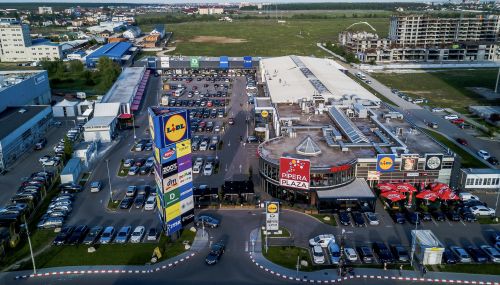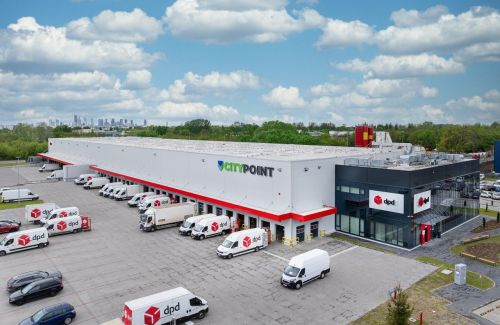Shopping in slippers
Property developers sometimes decide to put homes and shopping centres in one building. Most of these projects are in the largest conurbations, such as Warsaw
and the TriCity, where every unoccupied bit of land must be put to good use
The time when shopping was mostly done in small shops and street markets is now long gone. Housing estate retail gradually lost its former importance in the 1990s, when the first large-scale outlets and shopping malls appeared on the scene. But as the residential and retail markets matured, so people began to appreciate the convenience of local shops where they do not have to stand in long queues to buy one loaf of bread. Many residential developers decided to meet customer expectations halfway, ushering in an era of housing developments in which the lower storeys were set aside for local services. Some even went a step further and decided to situate small shopping centres in housing estates, where not only the essential provisions and basic services are sold, but also clothing and footwear.
Witawa welcomed
In 2003 in Gdynia on ul. Wielkokacka, Allcon Investment opened the Witawa shopping centre situated inside
a residential development. The building has 500 flats and
a shopping centre of 12,000 sqm total space (leasable space of 6,000 sqm). The attraction of the Witawa centre is demonstrated by the fact it has since been bought by the St. Wenceslas Property Fund portfolio (created by the Hunter Property Fund) for EUR 9 mln. The question is: what are the ingredients a project should have for it to operate successfully for many years? Małgorzata Ledwoch, the senior property and asset manager for King Sturge, suggests that: “Care should be given to contacts with residents to ensure the general available sections are in good shape, while the shopping section should not trouble building residents but rather simplify their daily life.”
Warsaw city glitter
Several examples of multifunctional developments with shopping embedded in the residential section can also be found in Warsaw, which holds around 1.5 mln sqm of retail space. One of the best known Warsaw projects is Koszyki, an early 20th-century market hall of some historic importance, which was bought more than a year ago by Quinlan Private Golub - an Irish-American company. It is to be reconstructed, with flats and offices on the same site as the shopping section.
Małgorzata Trzaskowska, the retail leasing manager of Quinlan Private Golub, describes how the Koszyki project is going to take shape shape: “The new residential buildings will be linked with the shopping sections via common spaces (e.g. car parks). There will be retail outlets selling general household articles, clothing and footwear as well as a jewellers and shops offering deluxe products. Part of this section will be earmarked for services and catering. The centre will be addressed to a wide cross-section of customers, including on the spot residents and the employees of nearby offices.”
Tatiana Spencer, King Sturge’s director of tenancy remarks: “Such developments may take place where a dense built-up area exists, ie. in larger cities. They will revitalize the urban fabric, as has happened in Germany, a fact which is rooted in the need to reap maximum profits from the land. Multifunctional projects are worth doing in city centres, where few unoccupied sites still remain.”
Menolly Poland, an Irish company developing the Nowe Powiśle residential estate on the site of the former Powiśle heat and power station in Warsaw, intends to create a small shopping centre from the plant’s old buildings in the investment’s second phase. Menolly envisages that the building will house several exclusive boutiques, although a final decision has yet to be taken, since the second part of the complex is still at the design stage. However there is no general consensus as to the sense of having elegant boutiques in Powiśle. Tatiana Spencer says she is not convinced that retailers of top of the range brands should operate in such centres: “The customers of estate shopping centres are looking for humdrum products for daily household needs which means such premises should be reserved for grocery stores, as well as a hairdressers and laundries. Shops selling less expensive footwear and drug stores have a role to play in such small formats. Rossmann’s is a chain which would be ideal for such a place.”
The Irish way
Caelum Development is another Irish company active on the Polish market, and that is intending to establish a small shopping centre on a residential site. This year it purchased from Trend Development the retail premises in the Dom Na Skarpie residential building on ul. Bukowińska in Warsaw’s Mokotów district.
Mirosław Cechowski, Caelum Development’s marketing manager, goes into more details: “We bought the shopping passage in this building because of its highly attractive location. It is the only such property of its type in the neighbourhood. We were also guided in this decision by its convenient and easily accessible location for the local residents and – even more importantly – by its size and offer.” The investor has bought five retail outlets of 2,000 sqm total leasable space connected by an internal passageway. Negotiations are currently under way with future tenants. It is already known that it will house a 1,500 sqm supermarket,
a bank, chemists and a catering unit. The investment should be finished in the fourth quarter of 2008. The size of the building where the shopping section is situated is not all that important, according to the investor, although its location is more significant.
Seen by a tenant
Krzysztof Krajewski, coordinator of development for HDS Polska (which owns Akapit, Relay, Inmedio, Virgin, Discover and 1 Minute retailers) states: “We are interested in leasing retail space in such buildings. It is rather the communications system and not so much the size of the centre which is the important factor. We also own free-standing stores, but prefer them to be located in so called ‘impulse zones’. We are never guided by templates when choosing a location, but always give detailed attention to whether a particular one will be profitable. Larger retailers do not really have a place in such buildings. We prefer to situate our cafés and bookshops in regular, large shopping centres.” n
Zuzanna Wiak






















































